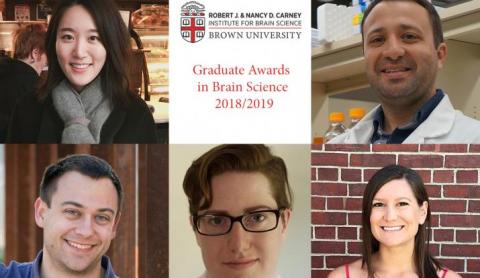Graduate Awards in Brain Science 2018/2019

The Carney Institute for Brain Science has awarded five Graduate Awards in Brain Science for the 2018/2019 Academic Year. These awards recognize early career scientists who have made outstanding achievements as graduate students and have demonstrated strong potential for successful lifelong scientific careers.
Heather Lee is a PhD candidate in Epidemiology working in the laboratory of Professor Stephen Buka. Her research project will combine epidemiology and neuroimaging methods (the latter in collaboration with Professor William Heindel) to examine whether prenatal exposure to elevated levels of pro-inflammatory cytokines results in more pronounced structural and functional brain abnormalities among individuals diagnosed with schizophrenia. Ms. Lee graduated with Honors from New York University with dual Bachelors degrees in Psychology and in Physics. She also completed a Post-baccalaureate Program in Data Science from Columbia University. Ms. Lee intends to pursue a research career examining how genetic and environmental risk factors interact to transmit neurodevelopmental disorders across generations. This award is supported by the Macklin Bequest.
Matthew Pescosolido is a PhD student in the Neuroscience Graduate Program working in the laboratory of Professor Eric Morrow. Mr. Pescosolido studies Christianson Syndrome, a novel genetic disorder caused by changes in an endosomal protein and characterized by intellectual disability, autism, and epilepsy. The goal of his research is to understand how mutations in this gene cause endo-lysosomal dysfunction and ultimately neurodegeneration. Mr. Pescosolido received a Bachelors of Arts in Psychology, with a minor in Sociology from Wheaton College. His long-term career goal is to become an independent researcher at an academic institution studying how cellular deficits in endo-lysosome functioning cause brain disorders associated with neurodevelopment and neurodegeneration.. This award is supported by the Macklin Bequest.
Marc Powell is a PhD candidate in the Biomedical Engineering Program working in the laboratory of Professor David Borton. Mr. Powell is developing new devices that allow for high-resolution and distributed interrogation of cortical regions with wireless electronics. He received a Bachelors of Science in Biomedical Engineering with highest honors from the Georgia Institute of Technology. After his PhD, Mr. Powell intends to start a company with the goal of continuing the development of the prototypes he has initiated along with the rigorous safety testing required to ensure it is suitable for clinical translation. This award is supported by the Daniel Cooper Graduate Fellowship Fund and the Charles A. Dana Graduate Fellowship Fund.
Rachel Stevenson is a PhD student in the Neuroscience Graduate Program working in the laboratory of Professor Barry Connors. She is characterizing ectopically triggered action potentials (those that travel in the opposite direction to the canonical action potentials), in different classes of interneurons in the orbitofrontal cortex. Ms. Stevenson graduated Summa cum laude in Biology (Neuroscience concentration) with minors in Chemistry and Psychology from Denison University. Ms. Stevenson's long term goals are to continue her academic training and to become an independent researcher studying the etiology of neurological pathologies on genetic and/or cellular levels. This award is supported by the Macklin Bequest.
Denise Werchan is a PhD candidate in Cognitive Science working in the laboratory of Professor Dima Amso. She studies developmental cognitive neuroscience, with a particular focus on the development of prefrontal cortex in infancy. Ms. Werchan's work tests the hypothesis that the infant prefrontal cortex supports learning of abstract rules that help infants make sense of the cluttered and rapidly changing multisensory world. She graduated Summa Cum Laude with Honors from the University of Arizona with a degree in Psychology, and a Minor in Computer Science. Ms. Werchan plans to establish a career as an independent investigator in the emerging field of developmental cognitive neuroscience. This award is supported by the Robin Chemers Neustein Graduate Research Fund.



